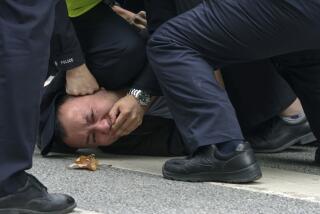Egyptian protesters again defy curfew; many police stand down
CAIRO — Egyptian protesters defied a government-imposed curfew for a second night and lawlessness spread across Cairo as police backed off from confrontations in most areas of the capital, allowing thousands of demonstrators free rein through the city center.
On the fifth day of growing unrest by demonstrators demanding the ouster of President Hosni Mubarak, the embattled leader named a vice president for the first time in his 30-year reign, a sign that he would continue to resist the popular uprising’s call for his resignation.
The choice of intelligence chief Omar Suleiman as Egypt’s second-in-command nevertheless met with some positive reaction. Suleiman is a seasoned veteran of the power structure and, in some quarters at least, is considered preferable to Mubarak’s son, Gamal, previously seen as being groomed to succeed his father.
Hisham Kassem, a journalist and political analyst, said Suleiman was a smart choice.
“When you end the Mubarak regime, you’ll need a powerful man during the transition, and this is a powerful man. Omar Suleiman is the best option,” Kassem said.
On the streets of the capital, an almost festival-like atmosphere prevailed, with protesters -- including men, women and even children -- chanting anti-government slogans and calling for Mubarak’s resignation. At the same time, the absence of security forces contributed to a growing sense of anarchy. Egyptian security forces reported that at least 62 people had been killed in the last two days of clashes between police loyal to the government and protesters seizing on the revolutionary mood enveloping the country.
Witnesses and Arab-language news channels reported the shooting of protesters at a melee in front of the Interior Ministry in Cairo. Al Jazeera television, whose satellite signal has been jammed by Egyptian authorities, showed gruesome, bloody images of what appeared to be the bodies of about a half-dozen corpses in a morgue in Cairo. They were mostly young men, but include a grey-haired, middle-aged man. Images of dead protesters during the uprising in Tunisia earlier this month inflamed passions among protesters and further emboldened opponents of the regime.
By the afternoon, many residents and business owners reported incidents of looting and robbery. For the most part, police, even traffic cops, were absent and residents complained they were told to fend for themselves.
Air traffic to and from Egypt was disrupted after the government expanded a curfew to run from 4 p.m. to 8 a.m. -- largely ignored by the protesters but accommodated by airlines serving Cairo and other major Egyptian cities. U.S. carrier Delta Airlines indefinitely suspended its flights to Egypt because of the mounting unrest.
By early evening, sporadic gunshots could be heard throughout Cairo and smoke rose from several small buildings, including the top floors of the National Democratic Party headquarters, a midrise office tower along the Nile River.
In a stark symbol of the government’s apparent paralysis, flames climbed out of the office tower’s windows throughout the day without firefighters responding.
Though many demonstrators expressed contempt for police and viewed their absence as a victory, others accused the government of withdrawing security forces in a cynical attempt to foster anarchy and violence so panicked citizens would demand their redeployment.
“The government is trying to transform the people’s revolution into looting mobs so they can justify cracking down,” said Cairo University Professor Mahael Said, 51, who has been participating in the street protests since Friday. “But we are not going to let them do that.”
In the downtown area, demonstrations were mostly peaceful for much of Saturday. Unlike previous days in which police used tear gas and water cannons against demonstrators, the only visible government security presence was a few military tanks and soldiers.
Many of the soldiers were unarmed, chatting with protesters, kissing babies and signaling their support with waves and thumbs-up encouragements. They made no effort to control or interfere with the protests.
But in the outlying neighborhoods and suburbs, residents complained of an alarming rise in crime. Many homeowners stood outside their properties, holding sticks to ward off potential thieves.
“We’re staying up all night,” said Khalid Talaat, a 19-year-old high school student who was standing sentry outside his Cairo home armed with an electric shock device. He said he and his neighbors planned to take shifts protecting the street.
Khalid al Labban, 32, who lives in the western part of Cairo, said he rushed out of his home Saturday afternoon to defend a neighborhood retail shop from gangs trying to break in with clubs. “My hand is swollen from having to swat people away,” he said.
Throughout the Arab world, opponents of authoritarian governments were inspired by the Egyptian protesters.
In Yemen, about 100 marchers descended on the Egyptian Embassy to show solidarity with the swelling protests, according to the Yemen Post. In Iran, students demonstrated in front of the Egyptian interest section office in Tehran to show their support for the protesters in Egypt, Tunisia and other Arab countries, according to the Islamic Republic News Agency.
Egypt’s unrest itself was ignited by Tunisians’ success is driving strongman Zine el Abidine ben Ali from power two weeks ago.
Times staff writer Borzou Daragahi contributed to this article.
More to Read
Sign up for Essential California
The most important California stories and recommendations in your inbox every morning.
You may occasionally receive promotional content from the Los Angeles Times.











